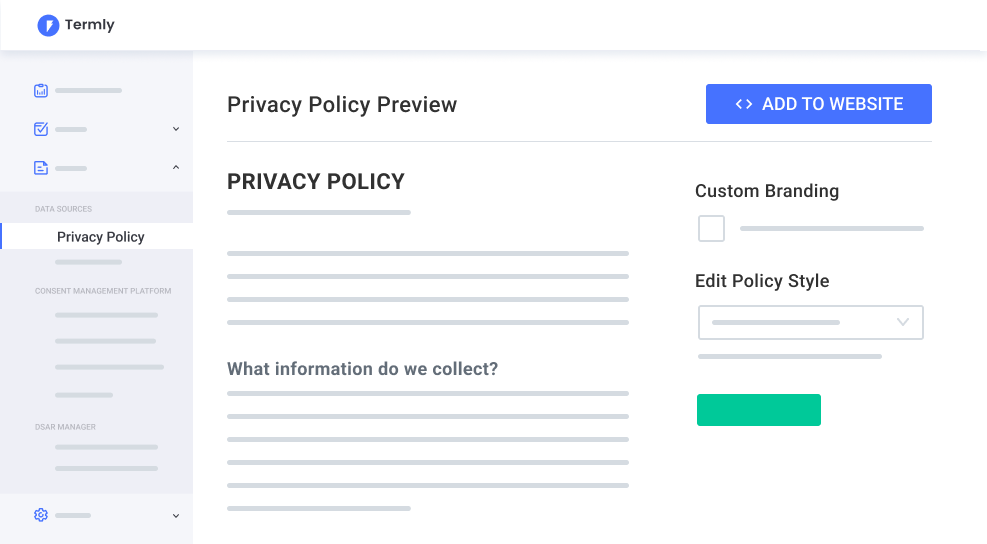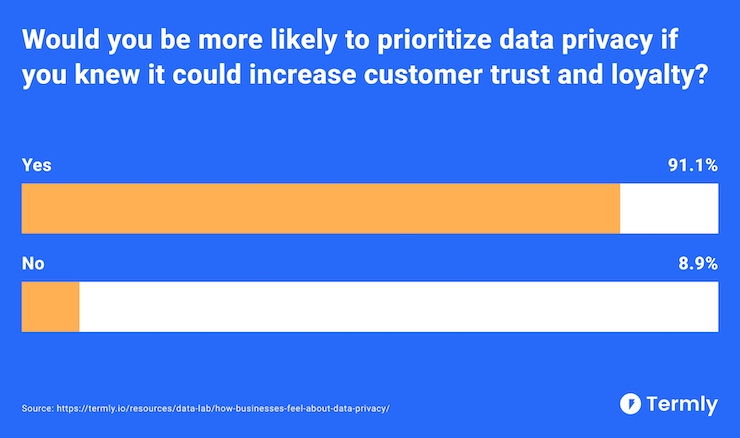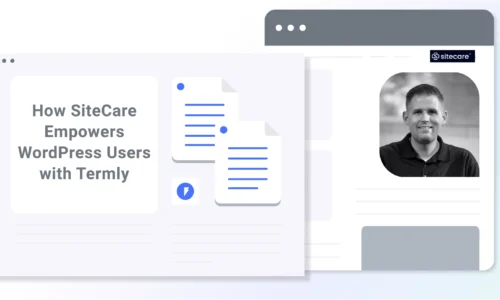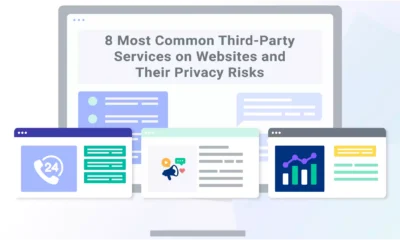If you run a WordPress site or manage multiple of them for clients, staying compliant with privacy laws is no longer optional. Fortunately, aligning your site with these requirements doesn’t have to be complicated, especially with the right help.
We talked with Ryan Sullivan, Chief of Staff at SiteCare, a leading provider of managed WordPress services, to learn why they’ve made Termly’s data privacy tools and consent solutions part of their operations and recommend it to their clients.
Below, you can read about his experience.
According to SiteCare, Termly…
 Solves 90% of their client use-cases
Solves 90% of their client use-cases
 Installs quickly
Installs quickly
 Simplifies troubleshooting
Simplifies troubleshooting
Who Is SiteCare?
SiteCare provides managed WordPress services that help businesses keep their website secure, fast, and optimized for performance, SEO, and accessibility.
While they initially focused on working with small businesses, they now support both SMBs and enterprise-level operations, some of which operate in highly regulated spaces and industries.
Termly’s Strategic Partnerships Manager, Sarah Warner, sat down with SiteCare’s Chief of Staff, Ryan Sullivan, to discuss how SiteCare uses Termly and now recommends it to their WordPress clients.
According to Sullivan, this includes “things like IT and healthcare and finance — those are some of the areas where we find concentrations or pockets of clients, and that’s what makes up the bulk of our client base today.”
Challenges SiteCare & Clients Faced
With so much of SiteCare’s work focused on performance, SEO, and security, data privacy became a repetitive and time-consuming challenge for Sullivan’s team and the WordPress clients they support.
1.) Privacy and consent management demands from legal departments left clients confused and concerned

Sullivan noticed a significant uptick in the number in inquiries SiteCare was receiving from clients about data privacy, consent management, and privacy laws.
“Clients are asking more questions about privacy than they ever have before,” he said, “usually, it kind of trickles down from their legal departments wanting to know, ‘Hey, are we in a good spot with this?’”
Sullivan is referring to the data privacy legal landscape, which continues to grow and evolve each year, directly impacting businesses who’ve struggled to keep up with and understand the ever-changing requirements and standards, including those using WordPress.
According to some sources, WordPress-hosted sites represent 43.4% of all websites on the internet.
This was the case with some of SiteCare’s clients.
According to Sullivan, those legal departments are asking so many questions because of compliance concerns specifically regarding privacy laws like the General Data Protection Regulation, the California Consumer Privacy Act, and more.
Businesses impacted by these laws must meet specific requirements or they risk getting penalized for noncompliance. However, SiteCare’s WordPress clients kept running into issues.
2.) The other “solutions” were just as complex and confusing as the legal demands

Unfortunately, Sullivan experienced SiteCare clients using data privacy solutions that were seemingly just as complex, confusing, and technical as the privacy laws themselves.
Sullivan told Warner, “The solutions that were being used, frankly, were just patchwork.”
He would know.
SiteCare helps thousands of WordPress sites solve this exact type of problem.
Sullivan added, “We just found ourselves in a place [where] a client would say, ‘Oh, our legal team sent us this script from some random service that they signed up for. We need this to be implemented,’ and it would be some kind of complex API integration just to get a consent banner and privacy policy displaying on their website…”
At times, these complex, technical solutions were finicky, difficult to install, or felt intimidating to the average WordPress client.
In other words, they felt the process was unapproachable.
“It just felt like there were way too many pieces involved,” said Sullivan.
3.) Those “solutions” also weren’t cheap

Another glaring problem Sullivan pointed out was that some of these other solutions offered basic data privacy and consent tools at a very high cost.
In particular, he references data privacy solutions that cost thousands of dollars per year.
“There are a lot of solutions out there that have a monthly fee with a comma in it to do those two very basic things of literally having a dynamic privacy policy and displaying consent banners and managing cookies.”
For many businesses, especially smaller enterprises working in spaces like WordPress, that kind of cost felt fully unrealistic.
For Sullivan, he said, “Those never felt like great options to recommend either.”
How Termly Helped
When asked why SiteCare chose Termly as their go-to recommended privacy compliance and consent management tool, it’s no surprise that Sullivan was so quick to refer to Termly’s:
- Reliability,
- Ease of use, and
- Ability to meet the diverse needs of their clients.
For his WordPress clients and the type of work they do, reliable and repeatable solutions like Termly are extremely valuable.
He told Warner, “we were just seeing enough volume of conversations and tickets around this to say, ‘Okay, what can be our go-to solution that covers most of the needs of our clients?’”
Sullivan and the team at SiteCare are also very much aware that data privacy needs are nuanced and vary significantly from one business to the next.
“We have some clients that are in some really weird industries, or they have some very complex configurations and setups.” They know that there isn’t a one-size-fits-all solution for every single edge case.
But, as it turns out, Termly offered solutions that aligned with the majority of SiteCare and their clients’ needs.
“From everything that we were looking at, Termly was covering more than 90% of all the potential use cases that would come up.” – Ryan Sullivan, Chief of Staff, SiteCare
Sullivan told Warner, “That’s when we decided to standardize, build some workflows around it, build some client language around it, and really make it something that’s kind of just our immediate go-to when we get client requests that fit into that match.”
Now, if a SiteCare client is in need of consent solutions and data privacy supports, Sullivan directs them to Termly.
Termly’s Valuable Assets
Sullivan told Warner that Termly offers two useful tools that are now must-haves for SiteCare and their clients due to their ease of implementation and use: the policy generators and consent management features.
Policy Generation with Termly

In reference to policy generation, Sullivan said, “that was always a really big sticking point before we found Termly, because most of the solutions out there were strictly technical solutions.”
Making legal policies has always been a time-consuming, complex process for businesses.
Sullivan went on to clarify some of the issues SiteCare and their clients would run into before trying Termly, like clients being asked to make their own contracts, create their own content, and bring their own policies into an already technical solution.
Buyers he worked with were in situations where they needed to not only find attorneys, but specific data privacy attorneys who specialize in different privacy laws and legal landscapes.
Sullivan said, “There’s just lots of friction and roadblocks. So, the policy generation piece is super valuable.”
Reliable automatic solutions, like Termly, help simplify the process without the high costs associated with legal fees.
For example, our Privacy Policy Generator helps businesses align with 30 privacy laws from around the globe by asking easy questions about your website. It’s backed by our legal team and includes tips and frequently asked questions to further simplify the process.
For SiteCare and their clients, the positive impact of using Termly goes beyond the nine available policy generators.
Termly’s Consent Management Solutions

On the topic of Termly’s valuable features, Sullivan also told Warner that, “consent management is the other piece that pretty much all of our clients who are using Termly adopt really quickly.”
Termly’s Consent Management Platform aligns with opt-in and opt-out requirements from over 70 regions worldwide.
It includes features like multi-language support, script auto-blocking, custom banner styles, cookie policy generation, and aligns with the IAB TCF v2.2, Google Consent Mode, and more.
Based on Sullivan’s experience, more and more clients require consent management solutions, largely because of the evolving privacy legal landscape and consumers’ growing demand for more transparency and control over their personal information online.
“And we see it more heavily,” he said, “We kind of see it everywhere now, but we saw a big concentration initially in Europe. But that’s really come stateside for a lot of folks.”
Overall, Termly’s CMP has been an asset for SiteCare’s clients in need of consent solutions.
A Real-Life SiteCare Client Example
In the interview, Sullivan brought up an interesting client use case that highlights the advantages of using, or in this case, switching to Termly.
For context, the client had been using another tool and hired a freelance developer to help them implement it. According to Sullivan,
“They came to us after the freelance developer had spent 18 billable hours getting everything set up and implemented, and it still wasn’t working properly.”
These clients had spent significant amounts of time and money on their data privacy and consent needs.
They were frustrated and had spent thousands of dollars on a solution that still wasn’t working.
Sullivan said, “we were like, no, no. Pause, hit the brakes. Sign up here,” meaning Termly.
Sullivan explained to them that the cost was affordable, and offered to help them with onboarding based on whatever criteria they provide after creating a Termly login.
The problem was solved for them within one day.
Setting up Termly was easy for SiteCare’s client
According to Sullivan, signing up for Termly and creating an account was genuinely simple for their client. This was a huge relief for them, especially after spending so much time struggling.
Termly’s onboarding workflow and implementation were easier than pretty much anything SiteCare had previously tried.
He told Warner, “they were back to us with their new Termly account within a few minutes, and they were totally covered in one day for something that they had been waiting literally weeks on and spent thousands of dollars on.”
With Termly, SiteCare’s client saved money, time, and finally removed the stress and confusion from privacy compliance.
How did the client feel about Termly?
SiteCare’s clients may have felt relieved that their problems were solved, but according to Sullivan, they also expressed some exasperation, asking, ‘How come I didn’t know about this before?’!”
Termly’s been a data privacy provider since before the earliest days of the GDPR. The consent solutions and policy generators have adapted in real time as the world has felt the impact of the strictest data privacy law to ever exist.
“The thing that I think has become extremely useful is the automated script and the automated script detection,” Sullivan continued, “it essentially scans the website and says, ‘Here are the things that you are tracking. You are using tracking on your website.’”
The ability to then customize, organize, and edit the data types as needed is one of the features that makes Termly extra easy for their WordPress clients.
According to Sullivan, giving folks on the user side the ability to organize those data types into categories to enable data collect before or after consent is given in such a user-friendly way is incredibly valuable.
“That’s something that, with other tools, is a lot more complicated process and typically requires manual code-level review,” he said.
But with Termly the process is seamless.
How Recommending Termly Helps SiteCare
One key takeaway from Warner’s discussion with Sullivan is the connection between recommending useful, reliable, and affordable solutions, such as Termly, and building and maintaining trust with SiteCare’s very own clients.
“It has improved our trust with clients,” Sullivan told Warner.
He then referenced the clients in the story he shared, stating that they’re no longer constantly looking for freelancers to do random things for them.
Now, when they need something, they go to SiteCare.
According to Sullivan, “they come to SiteCare and say, ‘What’s the best tool for us to be able to do ABCD?’ And that’s been a huge benefit for us.”
How Failing to Prioritize Data Privacy Can Decrease Customer Trust
Towards the end of the interview, Sullivan brought up a valid point about the direct impact of data privacy on consumer trust.
“Depending on who the customers are that you’re serving, you can create a lot of customer dissatisfaction by not taking privacy seriously, and customers are more aware than they ever have been,” he says.
There are plenty of data privacy statistics in support of Sullivan’s claim. Modern consumers call for transparency, choice, and control over if, when, how, and with whom their personal data is collected, used, and shared.
Plus, according to a survey conducted by Termly, 91.1.% of businesses are willing to prioritize data privacy if they knew it would increase customer trust and loyalty.

Sullivan’s experiences with Termly act as a reminder for businesses who are still ignoring these consumer needs:
“When they want to know how their data is being used, and you don’t have a clear answer for that, or you don’t have a policy that clearly addresses that, that’s a deterioration of trust. That’s something that you’re going to take a hit on in lots of different ways.”
In Sullivan’s experience, this can lead to clients who don’t come back to the website, don’t buy the products being sold, and lot’s of other smaller repercussions that aren’t necessarily at the scale of a lawsuit but still negatively impact businesses.
Sullivan puts it nicely, and the Termly team agrees: “It’s death by 1000 paper cuts.”
SiteCare’s Key Takeaways
To the businesses still not taking data privacy seriously, Sullivan warns that “it’s risky.”
The risk is particularly high for businesses and agencies out there who still aren’t making data privacy and consent management a priority on their websites or apps.
In our interview, he makes an apt comparison:
“It’s like not filing your taxes year after year, and then just hoping you never get audited, that type of thing, right? Eventually, that type of problem does catch up to you.”
As Sullivan’s sentiments imply, there are real consequences to not following privacy laws, especially if a consumer complains to a supervisory authority or if an audit occurs.
This includes large fines, the cessation of data processing, civil lawsuits, and even possible jail time depending on the law.
“So, my recommendation would be to just give Termly your money, get this thing sorted out, and move on with your life. That’s it.”
Sullivan adds, “it’s way easier than filing your taxes, too.”
See why SiteCare recommends Termly to their clients, sign up for free today!












